Sometimes you’ll look at a car and just know that driving it will cause you to issue forth with an involuntary scream. Whether it is a scream of pleasure or one of terror, really depends on the car in question. One quick glance at this 1971 Austin Mini tells you that there might be more to this car than meets the eye, so it is a car that is definitely worth a look. Located in Westmount, Quebec, Canada, you will find the Mini listed for sale here on eBay. Bidding on this pocket rocket has reached $4,050, but the reserve hasn’t been met.
Those bulging fender flares transform the meek and mild Mini into something that appears a whole lot more menacing. Those flares and the custom-made 3-piece Compomotive Wheels hint at something a bit different with this car. The body itself looks to be in good condition, although it looks like it would benefit from a wash and polish. There is some work there for the next owner to finish. The main task would be to work out how to attach the custom, one-piece front clip to the car. This is only sitting in place at present, so a permanent solution would need to be found. Personally, I’d love to see it mounted to tip forward, but this might not be possible with the extremely low front spoiler that is fitted to the car.
So, now we get to the bit where the screaming comes in. Normally you might expect to find a 1,275 or 1,310cc pushrod 4-cylinder engine under the hood of a hot Mini. You don’t normally expect to find a Cosworth BDA-Series engine sitting there. This engine currently doesn’t run, but some time on a dyno a few years ago produced figures of 210hp. Those ponies are sent to the front wheels via a 4-speed straight-cut transmission. To cope with the significant power increase, the brakes have also received an upgrade, and the car now runs 4-wheel, cross-drilled discs. With that combination in a car this light, when you land on the anchors the Mini should stop…yesterday. While the car currently appears to sit on street-legal tires, I suspect that the Mini would be more at home on a track than a street. The straight-cut transmission and the amount of potential torque-steer that the engine could produce under hard acceleration might mean that it isn’t a comfortable street machine. Put it on a race track though, and then things could be a lot of fun.
In spite of what I have just said, one look at the interior does suggest that the ultimate destination for the Mini is the streets. All of the interior trim and carpet remain in place, and aside from those body-hugging bucket seats, there are no real indications of just what lies under the hood. There are some details that would need to be attended to if the interior was to be brought up to a reasonable standard, but it really looks like it will be a case of spending time rather than money to achieve this. One thing that I would probably be inclined to bin would be the existing wood-rimmed steering wheel. I love the feel of a chunky wheel, but that wheel (picture below) doesn’t look like it would be a comfortable thing to use.
I’ve seen some wild and woolly cars in my time, but this Mini is something completely different. I could imagine that once you become used to it, the driving experience would be something pretty incredible. Whether this would make a practical road car is open to debate, but it might well be okay on a limited basis. I personally think that it would be more at home on a track, but regardless of which path the next owner chooses to follow, it is a car that should be capable of giving some big and impressive vehicles a fair old scare.
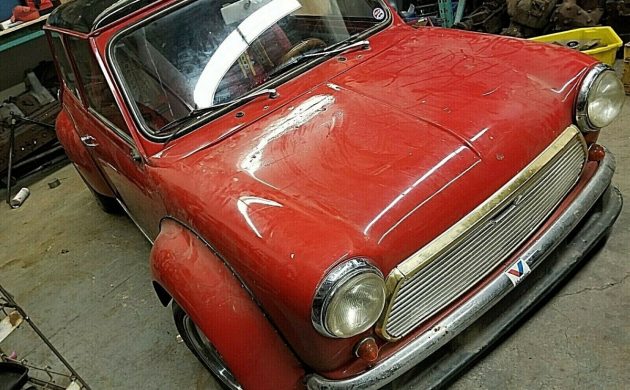
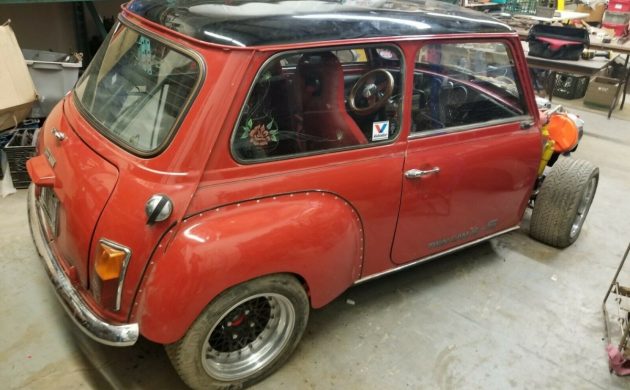
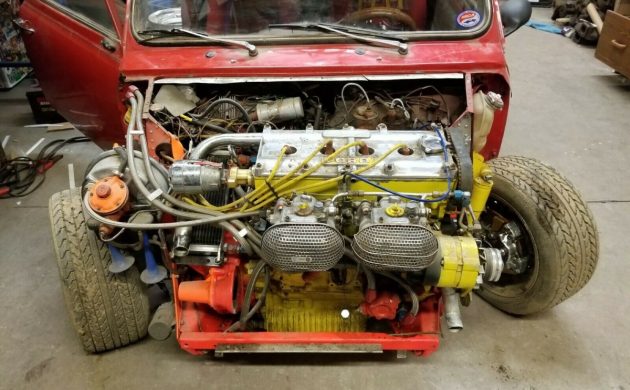
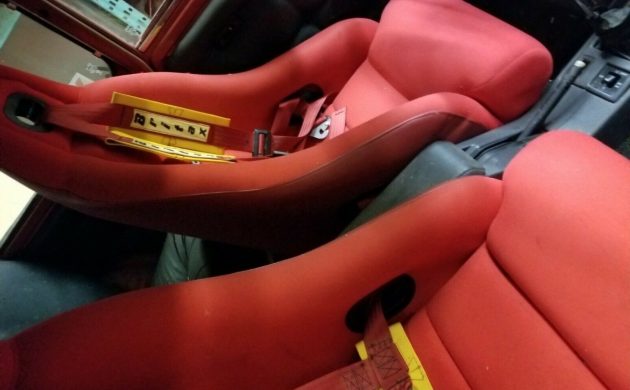
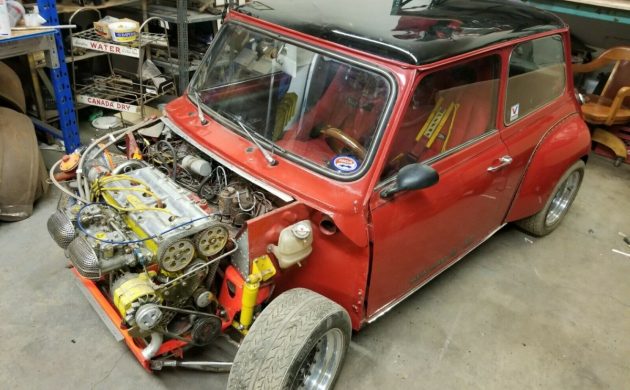
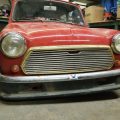
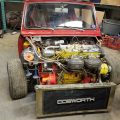
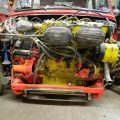
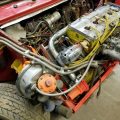
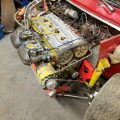
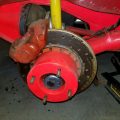
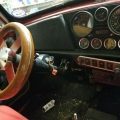





These vintage ones are super cool – even modded like this one. Sometimes we have a customer who is considering buying a newer Mini, which we strongly advise against, as they are absolutely terrible and are built to disappoint. Not this one tho…
Terrible Dave? Please explain as I’m debating jumping into the Mini pool.
The problem with this car-besides getting it across the border, is that there are not too many Lotus mechanics left who can get this engine up and running.
These engines are rare and expensive so you definitely don’t want to damage one if you don’t know what you are doing. This is more Ford BDA than Cosworth, so a complete teardown is necessary to see what bits are inside and what mods were performed by Norvic.
That steering wheel has got to go… one of the very interesting things about this car is the ISCA Show Car sticker on the windshield, this car obviously has a show history to it.
This car reminds me of a Norton I used to race. Would add power by changing something like the pistons. Then the crank would let go. Strengthen the crank and then the next weakest link would let go.
There would be no way I could resist enjoying that motor and finding the next weakest link. It looks like a blast.
Who in their right minds would try and drive a BDA on the street? Would love to meet them.
Racing is always been about finding the weak links. That’s half the fun of it!
The BDA & lotus twin cam are two different engine’s, the lotus is based on the early 60’s castiron 1500 pre- crossflow engine with an alloy twin cam 8 valve cylinder head.
The BDA is a post 70 alloy 1600 crossflow engine with an alloy twincam 16v head created for the MK1 escort RS 1600 which replaced the lotus engined model in 70/71 it wasn’t available in any other vehicle by the mid 70’s it had grown to 1800cc.
Then a new casting was created which started at 1800cc & was exclusively fitted to the MK2 escort RS1800 & over the remaining years of the 70’s it grew to 2000cc with a regular mid 200hp with either twin sidedraught Weber’s carbs or fuel injection.
Somebody dropped a ton of money. Needs a cooling system.
First thing I thought when I looked at it too
The Cosworth BDA and what could be 48 mm or the holy grail, 50 mm Webers are worth a small fortune.
As for being afraid to start it, if it was a new engine 30 years ago and stored properly all this time (one can hope but doubtful) it could run with a cam belt change, fresh oil and new plugs.
As for freshening the engine there are numerous vintage builders who prepare Cosworth engines. Its not rocket science in that regard, just possibly expensive.
This Mini is best served by removing the BDA, installing a solid A Series, selling the BDA and covering the cost of buying the car and the A Series! The Cossie is easily worth $10-$15k as is.